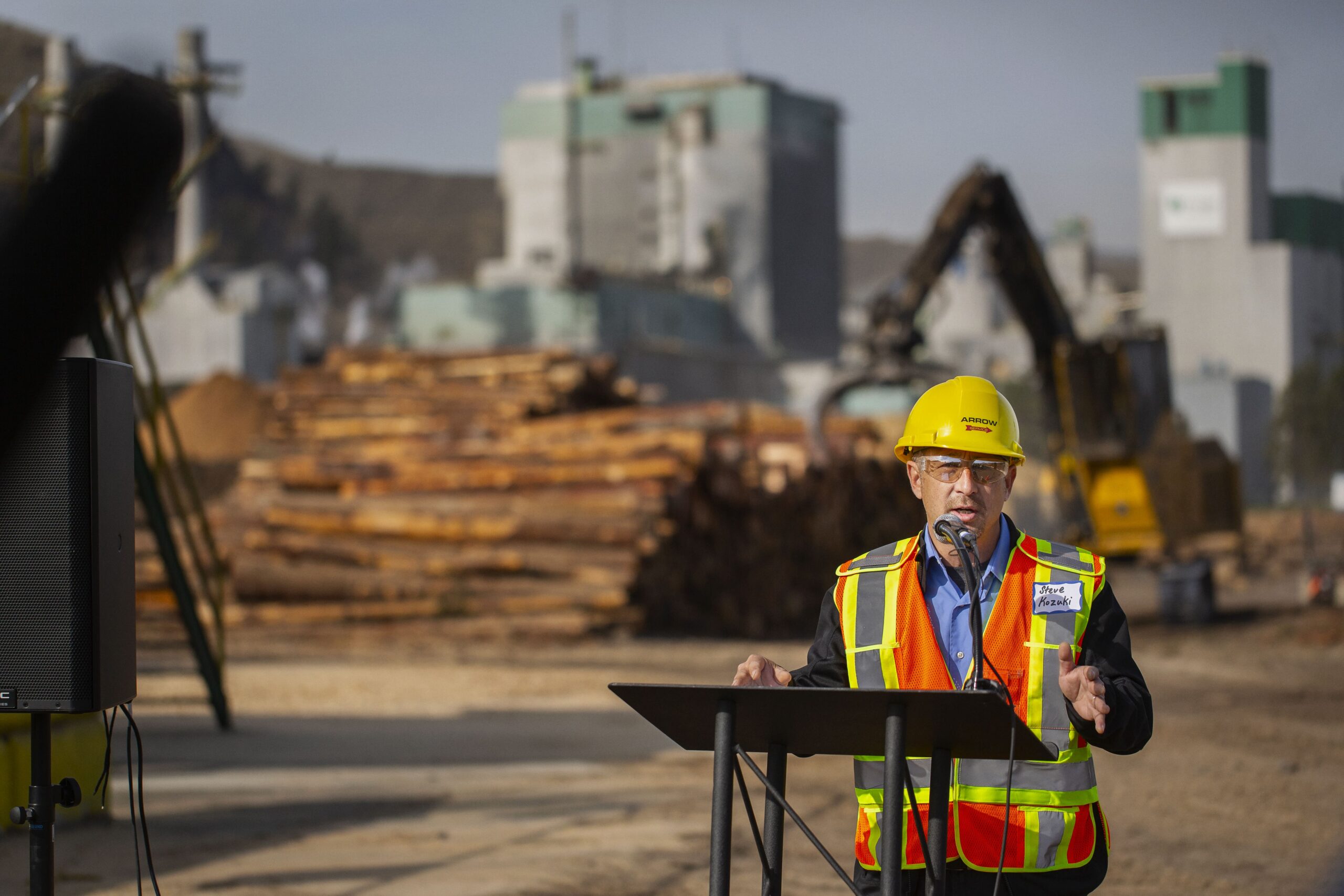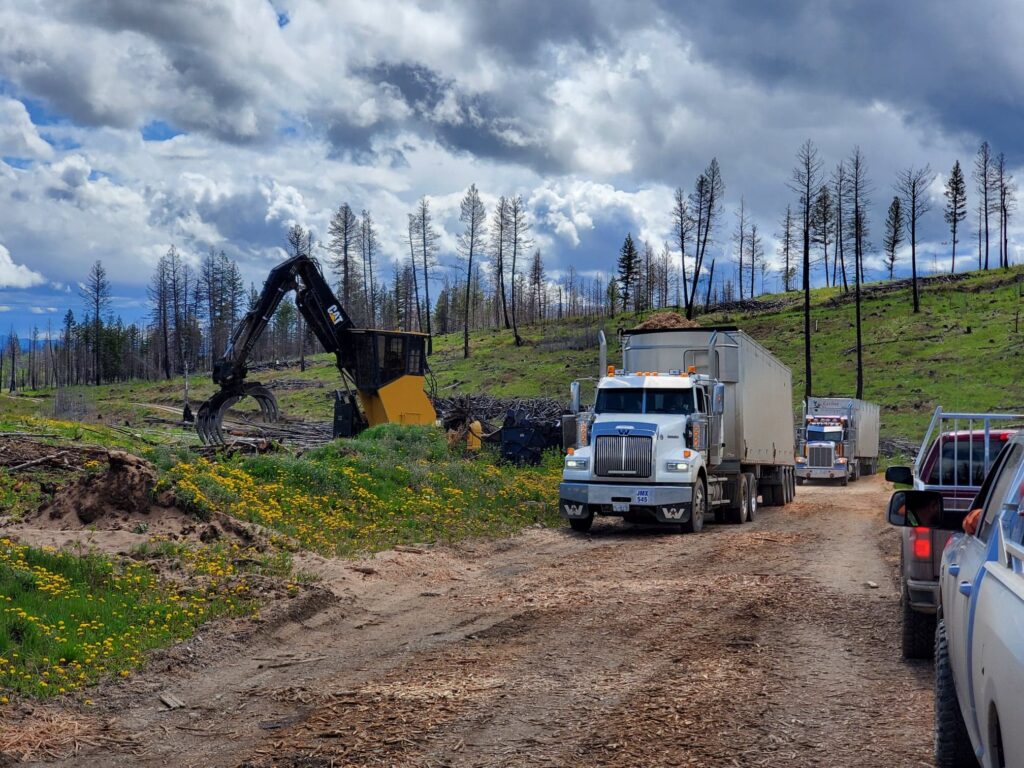Forestry Projects to Help Utilize Waste Wood or Mitigate Wildfire Risk
Cariboo region, B.C. – At a press event in Kamloops, the executive director of the Forest Enhancement Society of BC (FESBC), Steve Kozuki, announced 42 newly funded forest enhancement projects. These projects throughout the province of B.C. will either assist with the delivery of uneconomic forest fibre to pulp and pellet mills or green energy facilities or will help communities reduce their wildfire risk. Among these projects, six projects are located in the Cariboo region.

“The funding provided by the Forest Enhancement Society of BC is a testament to the Government of British Columbia’s drive to foster environmental sustainability and community wildfire risk reduction. Their support of these transformative projects demonstrates their commitment to helping communities reduce their risk of catastrophic wildfire events and transforming waste wood into green energy and sustainable products. They are taking action on climate change while at the same time promoting job growth and community resiliency throughout our province,” said Kozuki.
These newly funded projects come as a result of the $50 million given to FESBC earlier this year by the Ministry of Forests to boost fibre supply by utilizing uneconomic fibre and reduce wildfire risk while also supporting workers and communities.
“Our forests have endured some very difficult years of late. Devastating wildfires, pine beetle epidemics and the effects of climate change have stressed the environment more than ever before, with direct impacts felt by rural and First Nations communities,” said Bruce Ralston, Minister of Forests. “By using burned or damaged wood, projects around B.C. are providing the forest industry with fibre and are actively increasing our resilience to future wildfires.”

Photo credit: FESBC.
The six projects in the Cariboo region are:
- West Chilcotin Forest Products Ltd. Fibre Utilization 2023-25 Project: $1,354,929 in FESBC funding to transport low value logs located outside of the current economic range to the pulp mill in Quesnel, rather than being burned.
- 2023 Central Chilcotin Rehabilitation Ltd. Fibre Utilization Project: $3,218,240 in FESBC funding to grind wood waste material in slash piles for transport to pellet and energy facilities as well as transport low-value logs located outside of the current economic range to the pulp mill in Quesnel.
- Pressy Lake CP394 Rehab/Fibre Utilization Project: $2,073,000 in FESBC funding, Central Chilcotin Rehabilitation will harvest and chip low value burned stands to be shipped to Kamloops. Ground material will be used for pellets.
- Williams Lake First Nation-150 Mile House Wildfire Risk Reduction Project: $494,802 in FESBC funding to thin forests in 150 Mile House that are adjacent to houses.
- Nazko First Nation-Wildfire Egress Routes: $676,297 in FESBC funding to thin forests adjacent to egress routes around the Nazko community.
- Cariboo Pulp & Paper-Fibre Recovery and Utilization 2023-2025 Project: $2,500,000 in FESBC funding to transport low value pulp logs to the Cariboo pulp mill rather than being burned.
Many of these initiatives will utilize waste wood to produce green energy and sustainable products, reducing our reliance on fossil fuels and plastics that have long dominated our everyday lives. Other newly funded projects in the Cariboo will reduce wildfire risks for communities.
“With challenges such as insect epidemics, devastating wildfires, and the need to conserve old growth and wildlife habitat, it is crucial to find innovative solutions,” said Kozuki. “The declining timber supply has amplified the importance of utilizing leftover forest fibre that would have otherwise gone to waste.”
Of the 42 new projects funded throughout the province, 24 projects have direct First Nations involvement, while eight have some First Nations involvement.
ADDITIONAL QUOTE:
2023 Central Chilcotin Rehabilitation Ltd. Fibre Utilization Project
Michael Tomlinson, RPF, PAg, Consus Management Ltd.: “Our rural communities rely heavily on the forest industry for its significant contributions to economic stimulus and socio-economic benefits.
As climate change progresses and significant natural disturbances become increasingly likely, these programs enable us to prioritize industry diversification by piloting innovative processes. The aim is to create value-added products from damaged forests, even long after they are traditionally considered economically salvageable.
Central Chilcotin Rehabilitation Ltd.(CCR), in partnership with FESBC, has successfully diversified its business practices to enhance the utilization of forest fibre within the traditional territory of its partnered community and beyond. Furthermore, CCR remains committed to supporting government initiatives aimed at reducing our carbon footprint and enhancing our forests for the benefit of future generations.”
FESBC would like to gratefully acknowledge the financial support of the Province of British Columbia through the Ministry of Forests.
